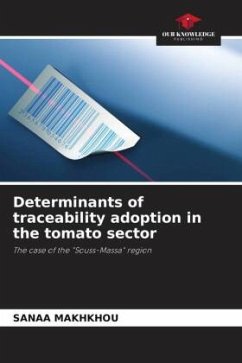Traceability is seen as a response to the state of uncertainty linked mainly to the food crises of the late 20th century. With the implementation of European regulation no. 178/2002 on January 1, 2005, all players in the food chain must be mobilized to provide maximum guarantees and assurances to end consumers, both in terms of quality and safety. In the case of the Moroccan tomato industry, traceability - as a strategic management approach - appears to be a managerial innovation that is still in the adoption phase. The aim is to identify the determinants of the adoption of a traceability approach and the implementation of traceability in the specific context of tomato companies and packing stations in Morocco. We present a model in this sense, proposing to combine stakeholder theory with that of corporate social responsibility. We discuss ten generic research case studies, based on a qualitative analysis of tomato exporters in the Souss Massa region.
Bitte wählen Sie Ihr Anliegen aus.
Rechnungen
Retourenschein anfordern
Bestellstatus
Storno








